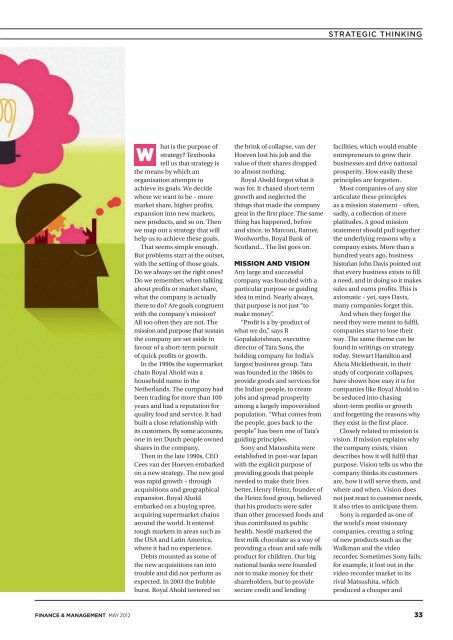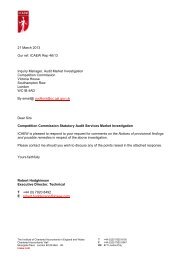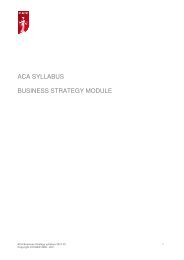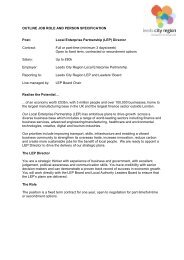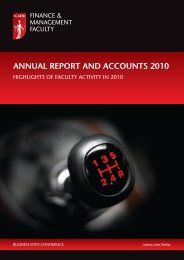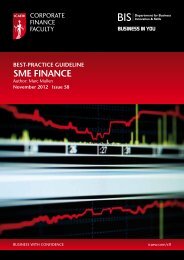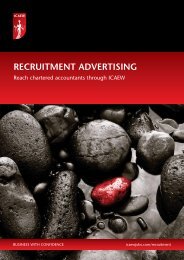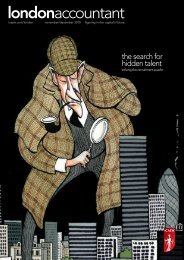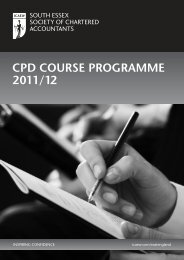Hit the road Positive leadership for troubled times - ICAEW
Hit the road Positive leadership for troubled times - ICAEW
Hit the road Positive leadership for troubled times - ICAEW
You also want an ePaper? Increase the reach of your titles
YUMPU automatically turns print PDFs into web optimized ePapers that Google loves.
STRATEGIC THINKING<br />
W<br />
hat is <strong>the</strong> purpose of<br />
strategy? Textbooks<br />
tell us that strategy is<br />
<strong>the</strong> means by which an<br />
organisation attempts to<br />
achieve its goals. We decide<br />
where we want to be – more<br />
market share, higher profits,<br />
expansion into new markets,<br />
new products, and so on. Then<br />
we map out a strategy that will<br />
help us to achieve <strong>the</strong>se goals.<br />
That seems simple enough.<br />
But problems start at <strong>the</strong> outset,<br />
with <strong>the</strong> setting of those goals.<br />
Do we always set <strong>the</strong> right ones?<br />
Do we remember, when talking<br />
about profits or market share,<br />
what <strong>the</strong> company is actually<br />
<strong>the</strong>re to do? Are goals congruent<br />
with <strong>the</strong> company’s mission?<br />
All too often <strong>the</strong>y are not. The<br />
mission and purpose that sustain<br />
<strong>the</strong> company are set aside in<br />
favour of a short-term pursuit<br />
of quick profits or growth.<br />
In <strong>the</strong> 1990s <strong>the</strong> supermarket<br />
chain Royal Ahold was a<br />
household name in <strong>the</strong><br />
Ne<strong>the</strong>rlands. The company had<br />
been trading <strong>for</strong> more than 100<br />
years and had a reputation <strong>for</strong><br />
quality food and service. It had<br />
built a close relationship with<br />
its customers. By some accounts,<br />
one in ten Dutch people owned<br />
shares in <strong>the</strong> company.<br />
Then in <strong>the</strong> late 1990s, CEO<br />
Cees van der Hoeven embarked<br />
on a new strategy. The new goal<br />
was rapid growth – through<br />
acquisitions and geographical<br />
expansion. Royal Ahold<br />
embarked on a buying spree,<br />
acquiring supermarket chains<br />
around <strong>the</strong> world. It entered<br />
tough markets in areas such as<br />
<strong>the</strong> USA and Latin America,<br />
where it had no experience.<br />
Debts mounted as some of<br />
<strong>the</strong> new acquisitions ran into<br />
trouble and did not per<strong>for</strong>m as<br />
expected. In 2003 <strong>the</strong> bubble<br />
burst. Royal Ahold teetered on<br />
<strong>the</strong> brink of collapse, van der<br />
Hoeven lost his job and <strong>the</strong><br />
value of <strong>the</strong>ir shares dropped<br />
to almost nothing.<br />
Royal Ahold <strong>for</strong>got what it<br />
was <strong>for</strong>. It chased short-term<br />
growth and neglected <strong>the</strong><br />
things that made <strong>the</strong> company<br />
great in <strong>the</strong> first place. The same<br />
thing has happened, be<strong>for</strong>e<br />
and since, to Marconi, Ratner,<br />
Woolworths, Royal Bank of<br />
Scotland... The list goes on.<br />
MISSION AND VISION<br />
Any large and successful<br />
company was founded with a<br />
particular purpose or guiding<br />
idea in mind. Nearly always,<br />
that purpose is not just “to<br />
make money”.<br />
“Profit is a by-product of<br />
what we do,” says R<br />
Gopalakrishnan, executive<br />
director of Tata Sons, <strong>the</strong><br />
holding company <strong>for</strong> India’s<br />
largest business group. Tata<br />
was founded in <strong>the</strong> 1860s to<br />
provide goods and services <strong>for</strong><br />
<strong>the</strong> Indian people, to create<br />
jobs and spread prosperity<br />
among a largely impoverished<br />
population. “What comes from<br />
<strong>the</strong> people, goes back to <strong>the</strong><br />
people” has been one of Tata’s<br />
guiding principles.<br />
Sony and Matsushita were<br />
established in post-war Japan<br />
with <strong>the</strong> explicit purpose of<br />
providing goods that people<br />
needed to make <strong>the</strong>ir lives<br />
better. Henry Heinz, founder of<br />
<strong>the</strong> Heinz food group, believed<br />
that his products were safer<br />
than o<strong>the</strong>r processed foods and<br />
thus contributed to public<br />
health. Nestlé marketed <strong>the</strong><br />
first milk chocolate as a way of<br />
providing a clean and safe milk<br />
product <strong>for</strong> children. Our big<br />
national banks were founded<br />
not to make money <strong>for</strong> <strong>the</strong>ir<br />
shareholders, but to provide<br />
secure credit and lending<br />
facilities, which would enable<br />
entrepreneurs to grow <strong>the</strong>ir<br />
businesses and drive national<br />
prosperity. How easily <strong>the</strong>se<br />
principles are <strong>for</strong>gotten.<br />
Most companies of any size<br />
articulate <strong>the</strong>se principles<br />
as a mission statement – often,<br />
sadly, a collection of mere<br />
platitudes. A good mission<br />
statement should pull toge<strong>the</strong>r<br />
<strong>the</strong> underlying reasons why a<br />
company exists. More than a<br />
hundred years ago, business<br />
historian John Davis pointed out<br />
that every business exists to fill<br />
a need, and in doing so it makes<br />
sales and earns profits. This is<br />
axiomatic – yet, says Davis,<br />
many companies <strong>for</strong>get this.<br />
And when <strong>the</strong>y <strong>for</strong>get <strong>the</strong><br />
need <strong>the</strong>y were meant to fulfil,<br />
companies start to lose <strong>the</strong>ir<br />
way. The same <strong>the</strong>me can be<br />
found in writings on strategy<br />
today. Stewart Hamilton and<br />
Alicia Micklethwait, in <strong>the</strong>ir<br />
study of corporate collapses,<br />
have shown how easy it is <strong>for</strong><br />
companies like Royal Ahold to<br />
be seduced into chasing<br />
short-term profits or growth<br />
and <strong>for</strong>getting <strong>the</strong> reasons why<br />
<strong>the</strong>y exist in <strong>the</strong> first place.<br />
Closely related to mission is<br />
vision. If mission explains why<br />
<strong>the</strong> company exists, vision<br />
describes how it will fulfil that<br />
purpose. Vision tells us who <strong>the</strong><br />
company thinks its customers<br />
are, how it will serve <strong>the</strong>m, and<br />
where and when. Vision does<br />
not just react to customer needs,<br />
it also tries to anticipate <strong>the</strong>m.<br />
Sony is regarded as one of<br />
<strong>the</strong> world’s most visionary<br />
companies, creating a string<br />
of new products such as <strong>the</strong><br />
Walkman and <strong>the</strong> video<br />
recorder. Some<strong>times</strong> Sony fails;<br />
<strong>for</strong> example, it lost out in <strong>the</strong><br />
video recorder market to its<br />
rival Matsushita, which<br />
produced a cheaper and<br />
FINANCE & MANAGEMENT MAY 2012<br />
33


